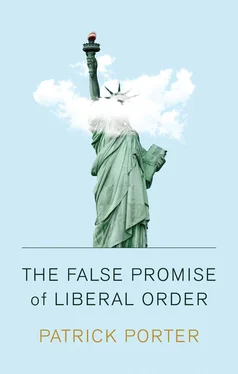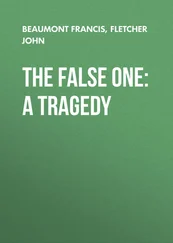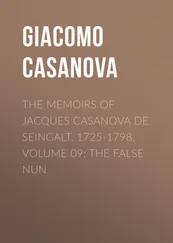Patrick Porter - The False Promise of Liberal Order
Здесь есть возможность читать онлайн «Patrick Porter - The False Promise of Liberal Order» — ознакомительный отрывок электронной книги совершенно бесплатно, а после прочтения отрывка купить полную версию. В некоторых случаях можно слушать аудио, скачать через торрент в формате fb2 и присутствует краткое содержание. Жанр: unrecognised, на английском языке. Описание произведения, (предисловие) а так же отзывы посетителей доступны на портале библиотеки ЛибКат.
- Название:The False Promise of Liberal Order
- Автор:
- Жанр:
- Год:неизвестен
- ISBN:нет данных
- Рейтинг книги:4 / 5. Голосов: 1
-
Избранное:Добавить в избранное
- Отзывы:
-
Ваша оценка:
- 80
- 1
- 2
- 3
- 4
- 5
The False Promise of Liberal Order: краткое содержание, описание и аннотация
Предлагаем к чтению аннотацию, описание, краткое содержание или предисловие (зависит от того, что написал сам автор книги «The False Promise of Liberal Order»). Если вы не нашли необходимую информацию о книге — напишите в комментариях, мы постараемся отыскать её.
The False Promise of Liberal Order
The False Promise of Liberal Order — читать онлайн ознакомительный отрывок
Ниже представлен текст книги, разбитый по страницам. Система сохранения места последней прочитанной страницы, позволяет с удобством читать онлайн бесплатно книгу «The False Promise of Liberal Order», без необходимости каждый раз заново искать на чём Вы остановились. Поставьте закладку, и сможете в любой момент перейти на страницу, на которой закончили чтение.
Интервал:
Закладка:
Anyone writing about international order is in the debt of Hedley Bull and Robert Gilpin. I was never lucky enough to meet either, but hope they would have thought this book worthwhile. We are also intellectually indebted to two ‘Johns’ – Mearsheimer and Ikenberry – who, after the fall of the wall, built the theoretical floor on which the rest of us dance. The first John helped to hammer out the realist tradition that has inspired this work. And while I challenge the second John’s arguments, this book would not have been possible without his seminal body of thought.
Lastly, a word about the United States. Much of what follows is wintry. That wintriness does not flow from hostility. To the contrary, it is offered in a spirit of tough love, in solidarity with Americans and their allies who sense that something has gone very wrong. And in this century, flattery has gotten the republic nowhere.
Introduction: Nostalgia in an End Time
In Cormac McCarthy’s noir western novel, No Country for Old Men , an honourable sheriff sees brutal, lawless days fall on his county, seemingly out of nowhere. He seeks solace by imagining a lost era of chivalry. He recalls an era when lawmen didn’t bear arms, a world that never was. In the face of inexplicable evil, his dream gives him something to hold onto and affords him dignity. It also paralyses him, making him a hapless witness to the chaos. Substitute the violent frontier for the world and the sheriff for foreign policy traditionalists, and a similar reaction is now under way in our angry days. Aghast that the time is out of joint, with the rise of President Donald Trump, populist demagogues and dangerous authoritarian regimes abroad, a group of people lament a dying order and the passing of American primacy in the world. They look back to a nobler past. Like the sheriff, they sense an end time has arrived. And like the sheriff, their invocations of a lost era cannot restore it. Invoking an imagined past impoverishes history. And it damages our capacity to act effectively under a darkening sky.
This is a book about euphemisms. Euphemisms are nice-sounding words that enable us to talk about a thing while avoiding its brutal realities. In this time of tumult, a set of evasive and soothing images about the past has come together, to imagine a lost world, a so-called ‘liberal order’. Pleasant words, like ‘leadership’ and ‘rules-based international order’, abound as a dispute grows over international relations. That dispute concerns the most important questions: how did we get here? And what must we do? As I argue, the concept of liberal order is misleading, as is the dream of its restoration. ‘Ordering’ and the business of hegemony is rough work, even for the United States, the least bad hegemon. If we want to forge an alternative order to the vision of Trump, it cannot be built in a dream palace. Only by gazing at history’s darkness can we confront the choices of today.
‘Orders’ are hierarchies created by the strong, to keep the peace on their terms. There have been many orders: Roman, Byzantine, Imperial Chinese, Ottoman, Mughal, Spanish, French and British. They are often also imperial in their working. After all, most of history is a history of empire, a form of power that exercises final control over its subject societies. The great powers that do the ‘ordering’ remake the world partly through institutions and norms, and partly through the smack of coercion. Orders encourage a politeness of sorts, but a politeness that ultimately rests on the threat of force. When lesser powers forget this, the dominant states quickly remind them, as in 1956 when President Dwight Eisenhower threatened Britain with an economic crisis if it didn’t cease its military adventure over Suez. Supposedly, according to their creators, orders remake the world in ways that replace chaos with regularity, making international life more legible, peaceable and secure. 1As they order the world around them, hegemons articulate that order in elevated rhetorical terms that soften the realities of power. Euphemisms reflect the dominant power’s conceit that it is unique, serving only as the source of order, never disorder, and always for the common good. More predatory overlords, like Imperial Japan, gave their programmes of enslavement preposterous names, like the ‘Greater East Asia Co-Prosperity Sphere’. The instinct to euphemize also infects the United States, the gentlest hegemon thus far: wars are ‘police action’, crushing revolts is ‘counterinsurgency’, propaganda is ‘information operations’ and torture is ‘enhanced interrogation’. Reflecting on order ( imperium ) in his own time, and the gap between form and substance, the Roman historian Tacitus put a speech in the mouth of a Caledonian king who said of Roman violence, ‘these things they misname order: they make a desolation and they call it peace’. 2
To most of its admirers, America’s order, created around the end of the Second World War and now fading, was different because it was ‘liberal’, meaning that it was organized around freedom, consent and equality. To them, the ordering power was not an empire. It was a more benign ‘hegemon’, a word drawn from ancient Greek to mean ‘leader’. For the first time, according to this orthodoxy, the most powerful nation on earth forsook imperial aggrandizement, instead using enlightened measures to make a world safe for market democracy in which people could find emancipation. America possessed vast and unprecedented power, the hard instruments of wealth, intelligence, military force and an array of alliances. Despite being a new goliath, though, Washington bound itself into an international system of its own design, constraining its might and thereby winning authority. Unlike earlier orders, this was a truly international world system. It was founded primarily on rules. It opened up a once-closed world. It provided public goods like freedom of the seas, and stable monetary systems. Like all past hegemons, America regarded its settlement as not only legitimate, but sacred. 3
An international class of security experts and policy practitioners believes that there was such a benign dispensation, and that it lasted seven decades. In common, they believe America and the world are best served through an enduring marriage of liberal principles and American primacy, or supremacy. To its admirers, this new design was imperfect but noble. It marked a system of peaceful ordering – of hegemony without empire – to which we might return. The only alternative, they fear, is regressive chaos.
The apparent fall of this system is all the more distressing to its defenders, given that the ruin seems to come primarily from within. Rather than being conquered by an external aggressor, America’s order self-destructs. Western citizens lose faith in the project and fall prey to false consciousness. Demagogues, aided by sinister foreign powers, whip them up into a backlash. As Donald Tusk, President of the European Council, warned: ‘The rules-based international order is being challenged … not by the usual suspects, but by its main architect and guarantor, the US.’ 4Or, in the words of the idea’s principal theorist, G. John Ikenberry, it is as though the citizens of an unsubjugated Rome are tearing down their own city. An unsettling analogy for a supposedly non-imperial superpower.
We can speak of an American-led order. But a liberal one? We should be wary. For every order, including America’s, has a shadow. It is one of hypocrisy and the threat of force well beyond the bounds of liberal norms, be that threat brazen or quiet, astute or naive. Hegemons will have their prerogatives, whether this means insisting that others open their markets while protecting their own, demanding that their sovereignty be respected while conducting raids into others’ backyards, or denouncing election meddling while practising it. Not for nothing did Hedley Bull define order as ‘imperialism with good manners’. 5
Читать дальшеИнтервал:
Закладка:
Похожие книги на «The False Promise of Liberal Order»
Представляем Вашему вниманию похожие книги на «The False Promise of Liberal Order» списком для выбора. Мы отобрали схожую по названию и смыслу литературу в надежде предоставить читателям больше вариантов отыскать новые, интересные, ещё непрочитанные произведения.
Обсуждение, отзывы о книге «The False Promise of Liberal Order» и просто собственные мнения читателей. Оставьте ваши комментарии, напишите, что Вы думаете о произведении, его смысле или главных героях. Укажите что конкретно понравилось, а что нет, и почему Вы так считаете.












